Ten Tips from Verissimus and the Stoic Philosophy of Marcus Aurelius
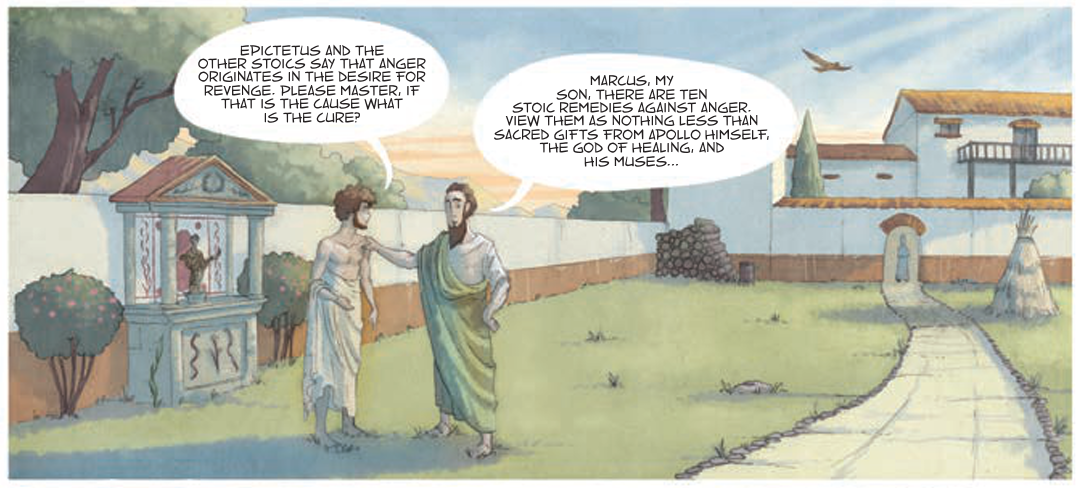
What does Stoic philosophy tell us about how to control our tempers? When we began working on our graphic novel, Verissimus, the illustrator, Zé Nuno Fraga, and I decided to show how colorful and action-packed Marcus Aurelius’ life really was. We also liked the idea, however, of leaving our readers with a good amount of practical advice from Stoicism, which they could take away and use to help themselves and others.
03.We know that this was a problem for Marcus because he tells us in the Meditations that he struggled, at first, to master his own temper. Later in life, Marcus had a reputation for remaining completely level-headed, even in the face of extreme provocation. So it appears that he succeeded in using Stoicism to master his natural quick temper. He did this by employing Stoic psychological practices, over and over again, on a daily basis. I can see parallels between many of these strategies and those employed in modern cognitive therapy. So I think that, with practice, they may help the rest of us cope with our feelings of anger too.
It was one of the men who provoked Marcus’ temper the most, ironically, who also taught him how to restore calm and rebuild friendships after an argument — his Stoic mentor, Junius Rusticus. We therefore speculated, in our illustrations, that it could have been Rusticus who taught Marcus the ten anger-management strategies he describes using in the Meditations (11.18). Marcus, curiously, refers to these as ten “gifts” from the god Apollo, and his nine Muses. Apollo, Lord of the Muses, was the god of the arts, including the arts of medicine and, in a sense, also philosophy. It’s perhaps fitting, therefore, that Marcus would call these therapeutic strategies, or self-help tips, gifts from the god of healing.
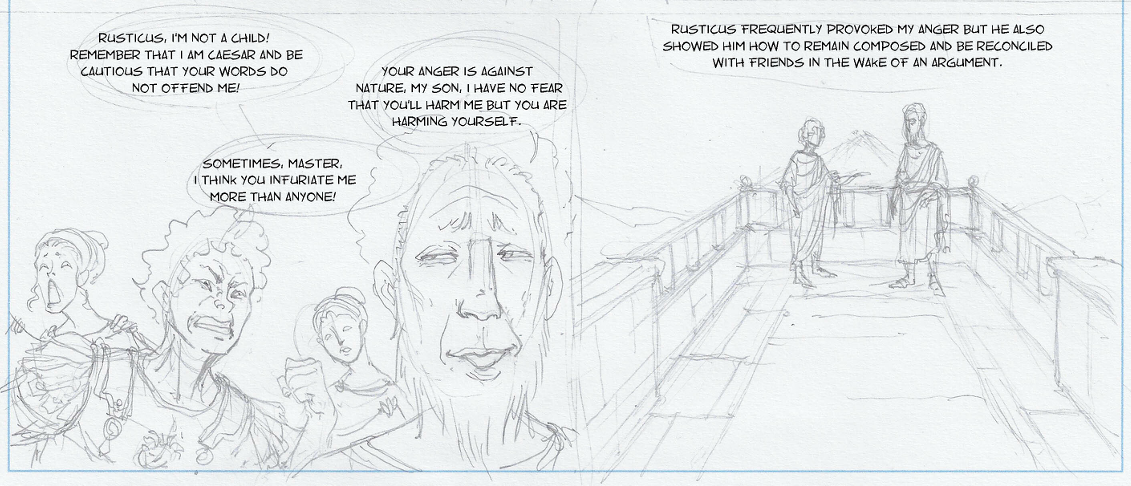
Marcus describes things he should tell himself whenever he noticed he was growing annoyed with someone. I would call these cognitive (thinking) strategies for anger-management. In this article, I’ll discuss each of his ten strategies in turn, adding a few comments, here and there, from my perspective as a cognitive-behavioral psychotherapist.
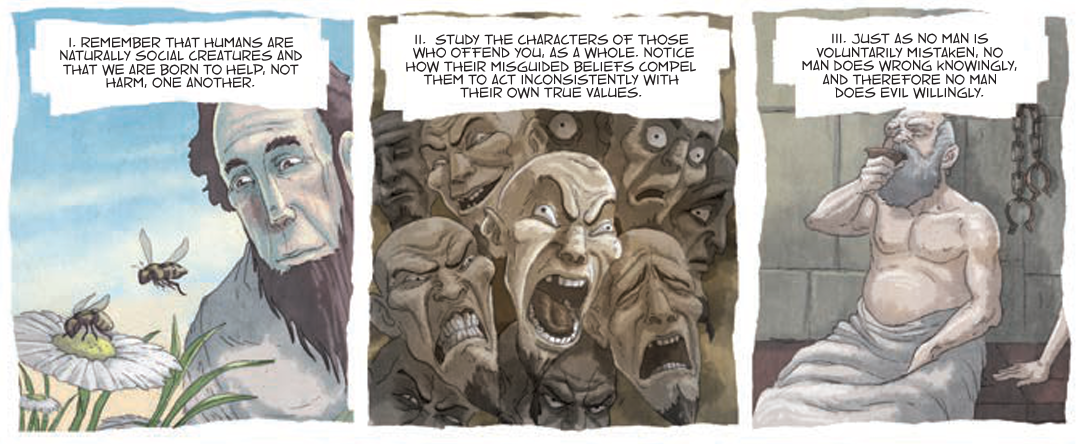
Remember that humans are social creatures 🔗
This seems to be the toughest Stoic strategy for most people to swallow today, although it’s the one Marcus appeals to most often. It’s actually based on a philosophical argument, about human nature, which predated Marcus by roughly six centuries. We can trace it back at least as far as the “Great Discourse” of the famous Sophist, Protagoras. He argued, foreshadowing Darwin’s theory of natural selection, that because humans happen to be more physically vulnerable than other creatures, they learned to form communities, which required developing principles of justice. We’re social creatures, by nature, because the survival of our ancestors depended upon their cooperation with one another.
Marcus frequently reminds himself of our social nature in the Meditations. We’re not unlike ants or bees, in this regard, who naturally flourish by working together. Of course, in reality, we often compete with and even fight against one another. Nevertheless, the Stoics believe that we have an innate duty to try to realize our potential for living harmoniously, by showing kindness and fairness toward one another. Stoics call this the virtue of “justice” (dikaiosune), although it includes actively trying to help, rather than harm, our fellow humans. Put very simply, Marcus believed that by reminding himself of our natural capacity for kindness and friendship, he would become more inclined toward these ideals, instead of simply giving in to feelings of anger.
Consider their character as a whole 🔗
When people become angry their thinking typically becomes more distorted. In a sense, anger makes us irrational, in several ways. The Stoics put it more bluntly: “Anger is temporary madness.” One of the simplest “cognitive distortions” we experience is called selective thinking. Angry people tend to focus their attention on every detail that feeds their negative emotional state. They also ignore things that might give them cause to feel less upset. When enraged we view the person annoying us through angry “tunnel vision”, in other words, whereas others might view them in a more rounded and complete way.
Narrowing attention in this way is like putting our annoyances under a magnifying glass. Stoics do the opposite by deliberately broadening their attention, and thinking about the other person’s character as a whole. The latter is a much wiser, and healthier, way of responding. Rather than denying or ignoring what someone did to upset us, we’re continuing to notice it, but also noticing many other details as well. Marcus says that when someone is starting to annoy him, he makes a conscious effort to think of their behavior in many different situations: how they eat, sleep, their other relationships, etc. He also considers how certain questionable assumptions, and perhaps even errors, may have shaped their actions. He does this to avoid the problem of selective attention and to arrive at a more balanced perspective on the character of others.
No man does evil willingly 🔗
Marcus knew that this was a famous “paradox” of Socrates. The Athenian philosopher, who had died over five centuries earlier, had paved the way for Stoicism — you could call Socrates the godfather of Stoicism. He believed that we all naturally want to do what’s good for us. However, everyone is fallible. So, in practice, we have misconceptions about what we should be doing. People who engage in wrongdoing believe that what they’re doing is right. That doesn’t mean they believe other people think it’s right, of course. People often consider themselves to be doing what’s right even though they know others consider their actions wrong. Brutal dictators like Hitler and Stalin arguably provide a good example: they were dangerously convinced that their actions were justified.
Socrates was able to look his accusers in the face and maintain this perspective, rather than growing angry, even when he was sentenced to death, and handed a cup of poison hemlock to drink. He noted, though, that if someone is misguided about what’s genuinely right and wrong, their actions aren’t entirely voluntary. No matter how awful they seem, their actions can be said to be determined by their own moral ignorance.
This is a very forgiving philosophy, in a sense. Marcus believed that by learning to view the behavior of others in this way he would reduce his frustration and annoyance with them. Perhaps this attitude also allows us to focus, more constructively, on the question of whether or not those engaged in wrongdoing can be persuaded to change their ways. It’s interesting to note that Marcus served, throughout his adult life, as a magistrate in the Roman courts. Like other Stoics, he believed in trying to reform others, where possible, rather than seeking revenge against them.
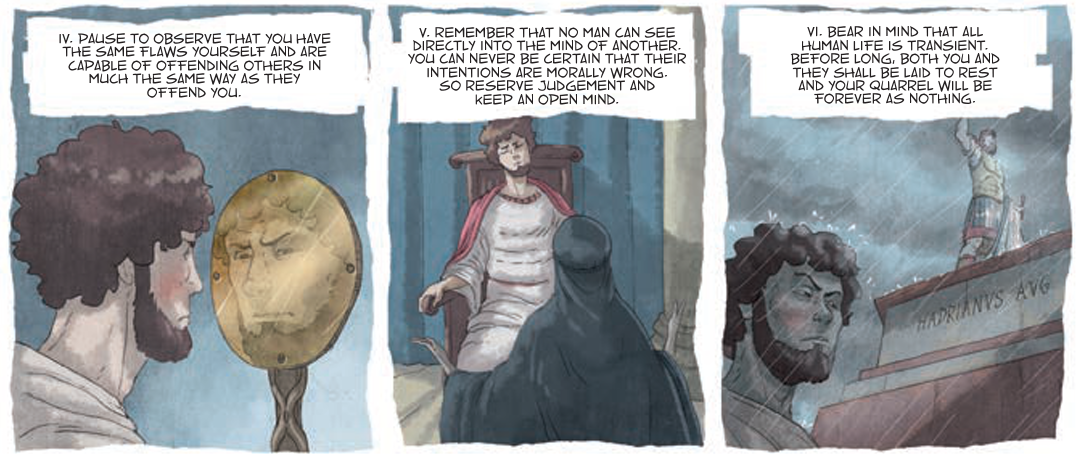
Realize that we all have similar flaws 🔗
Pause to look in the mirror when you’re starting to become annoyed with other people. Or at least, step back, metaphorically, from the situation, and take a careful look at your own character and actions. The Stoics were originally called “Zenonians” after their founder, Zeno of Citium. Later they named themselves the “Stoics”, after the Stoa Poikile, or “painted porch”, a public colonnade in the Athenian Agora where they met to discuss philosophy. Other schools of Greek philosophy were named after their founders, such as the Pythagoreans, Platonists, Aristotelians, and Epicureans. The Stoics, however, insisted that no man was perfectly wise or beyond reproach — not even their founder, Zeno, was flawless.
I think this attitude of humility is central to Stoicism. We tend to minimize or ignore our own weaknesses in a way that makes us all slightly conceited and narcissistic. The more angry we feel, the more unforgiving and self-righteous we tend to become. We may disapprove of the actions of another but we tend to become less acutely enraged when we consciously accept that we’re capable of exhibiting similar flaws ourselves. Psychologists used to call this “projection” — when you point a finger at someone, three of your own fingers are pointing back at you! Marcus thought that as soon as we notice ourselves becoming irritated with another person, therefore, we should take it as a signal that we must have lost sight of this. We’re being arrogant and ignoring our own weaknesses and should, instead, stop and think — we should look within ourselves.
Of course, people often do terrible things, even committing crimes like murder, of which we’d like to think that we’re utterly incapable ourselves. The Stoics would perhaps say that this is another form of conceit. Even if we have never done such terrible things ourselves, we may nevertheless have felt like doing them. We don’t know for sure what we could be driven to do if caught in very extreme circumstances. Perhaps you’re convinced nothing could ever compel you to think about actually killing another human, even for a split second. Nevertheless, we’ve all thought about lashing out against people, or seeking revenge, to some extent. In that regard, we all share vicious character flaws, albeit to varying degrees. Having the humility to concede that you’re not perfect yourself, as Marcus did, can sometimes help to reduce the intensity of your anger toward others.
Keep an open mind about their motives 🔗
Marcus spent decades studying jurisprudence, or legal theory, and took his duties as a Roman magistrate very seriously. Even as emperor, he presided over trials. He learned from extensive experience, presiding in the courts, how difficult it is to be certain about other people’s motives. Marcus noted that we often seem to do the wrong things for the right reasons. Many criminals likewise feel inwardly justified and self-righteous in their actions, or at least believe that the negative consequences for others of their bad behavior are quite trivial. Marcus recalls how those accused of wrongdoing are often indignant, believing themselves to be innocent. Things are not always what they seem. In fact, not only is it difficult to understand the motives of others but often they don’t even fully understand their own motives.
The Stoics want us to recognize the limits of our knowledge — we’re not mind-readers. Anger is often associated with unwarranted certainty about the supposedly vicious or corrupt motives of others. We jump to conclusions about what other people are thinking when we’re getting mad at them. Everything they do or say appears malicious. You can see that sort of negative confirmation bias operating every day in arguments on social media. The Stoics want us to remember that the reasons behind our actions are often hidden from public scrutiny. Yet anger is fueled by certainty. So to the extent that we can reasonably suspend judgment about the motives of others, we can learn to control our temper.
Remember that you both must die 🔗
As a young boy, Marcus was adopted by the Emperor Hadrian, and briefly raised in his villa. Later in life, though, he was surrounded by younger men who only knew Hadrian as a historical figure, from sculptures and anecdotes about him in books. Marcus would look at images of Hadrian and imagine that one day he too would be gone except for a few old statues and scraps of history, and eventually he would be forgotten completely. Marcus liked to meditate on how the concerns of Hadrian, and other great rulers who came before him, often seem more trivial in retrospect. They believed that they were very powerful and important men, and yet most of the things they cared about, and became angry about, have since been entirely forgotten.
When he was becoming irritated with someone, Marcus would therefore tell himself that before very long both he and the annoying person would be dead, and eventually forgotten. Once again, in a sense, this involves adopting a much broader perspective on events rather than putting them under a magnifying glass. (That’s a recurring theme in Stoicism.) When we remember that something is transient, we experience both its presence now and we simultaneously imagine a time before it existed and its absence in the future, after it is gone. If we can experience the presence and absence of something at the same time, we naturally reduce the intensity of our emotional reactions, such as feelings of anger. That’s why Marcus contemplated his own mortality, and that of the other person, when he noticed he was becoming angry, and reminded himself of the ephemeral nature of the things about which they were getting upset.
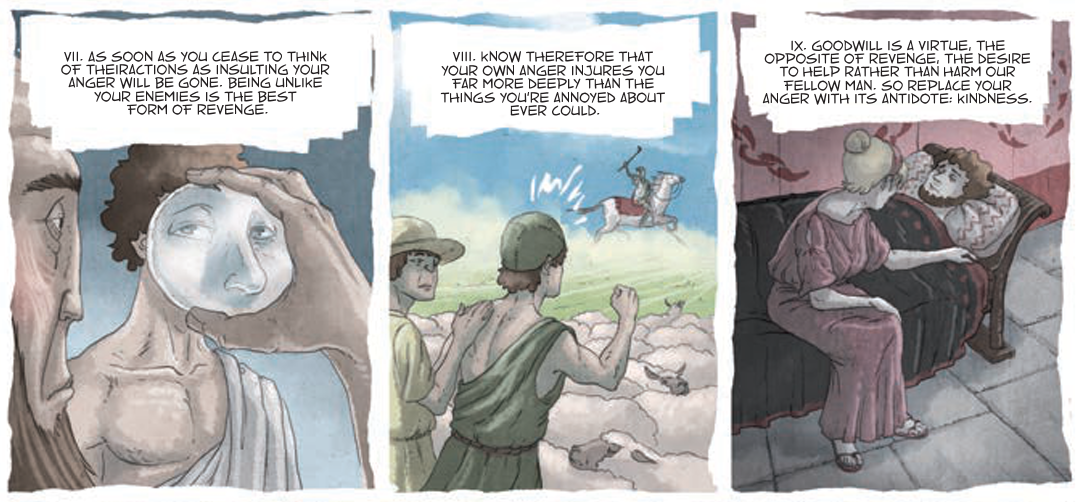
It is your own opinions that anger you 🔗
Marcus was a big fan of the Stoic philosopher Epictetus who famously said “It is not things that upset us but rather our opinions about them.” Marcus applied this to many situations, including feeling angry with someone. It is not the other person’s actions that make us angry, in other words, but rather our opinions, especially our value judgments, concerning what they did. We make ourselves angry, according to the Stoics. That’s more obvious if you consider that another person looking at exactly the same situation might feel less angry about it, or not feel angry at all. Indeed, you might not feel as angry about it yourself, months or years from now, looking back on events one day in the future.
This is arguably the most important psychological insight ever made by the ancient Stoics. It went on to become the inspiration for modern cognitive psychotherapy. Early pioneers of cognitive therapy, such as Albert Ellis and Aaron T. Beck, used to teach the quote above from Epictetus to their clients and students. Many modern research studies now confirm that our opinions (cognitions) play a key role in determining our emotional responses, and that by changing them we can change unhealthy emotions into more healthy and adaptive ones. Moreover, there’s now good evidence to support the conclusion that this insight alone can give us more control over our emotions and reduce their intensity. Simply reminding yourself, as Marcus did, that it’s not events that make you angry, but rather your opinions about them, can potentially be therapeutic in itself.
Anger hurts you more than the thing you’re angry about 🔗
This is another very fundamental Stoic principle that applies to many desires and emotions, not just anger. Our strong desires and emotions (“passions”), in general, do us more harm than the things about which we’re upset. The worst, perhaps, that other people can do is kill you, destroy your reputation, and all of your property. Anger, though, by penetrating right to the core of your being, can destroy your very character. The Stoics would even say that anger robs us of our humanity, if we let it, and turns us into wild animals.
There’s a hint of this attitude when people say “It’s not worth it!” to someone who is losing their temper or about to get in a fight. On one hand, the consequences of anger are often that we just make situations even worse for ourselves and others. Actions based on anger frequently do more harm than good. The Stoics emphasize this but they want to go even further and say that, its external consequences aside, anger transforms our very character by its existence, degrading us, and, in that sense, harms us more deeply than any external events ever could. Realizing that anger does us more harm than the things, or people, we’re angry with, though, should motivate us to look inward and focus on personal change rather than lashing out at others.
Kindness is the antidote to anger 🔗
The Stoics knew that one way to conquer a harmful emotion is to directly cultivate its opposite. Behavior therapists use a similar strategy named “counter-conditioning”, replacing one habit or emotion with another that naturally inhibits it. (Training in relaxation, e.g., is often used to counteract anxiety.) In Stoic psychology, anger is understood primarily as the desire for revenge — we want to harm someone, or at least for them to be somehow punished. It is associated with the belief that the other person has acted “unjustly”, or unacceptably. More fundamentally, it often derives from the idea that they have somehow harmed us, or at least are threatening to do so. Marcus, for instance, believed that anger is a form of weakness, for several reasons, one being that it is typically based on irrational fears and perceived injuries. A Stoic sage is above anger, because he or she is beyond the reach of fear.
Marcus believed that it requires great wisdom and strength to respond to the provocations of others with kindness. He actually says that true “manliness” consists in having the strength of character to show kindness rather than hatred and aggression. For Stoics, kindness, being the opposite of revenge, consists in the desire to help others rather than harm them. When we really grasp the contrast between these two emotions, it becomes obvious that they’re based on mutually incompatible attitudes. The Stoic ideal is to respond to our “enemies” by wishing to help them rather than harm them. The cognitive strategies above help to prepare the way for this. Marcus is not talking about gritting our teeth and pretending to show kindness but rather a fundamental transformation in our philosophy of life and attitude toward others.
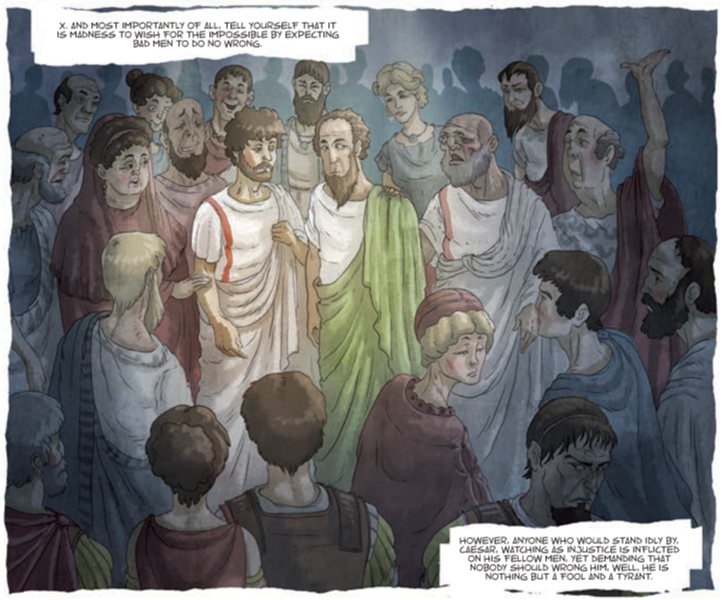
Realize the folly of expecting everyone to be wise 🔗
Marcus, as we’ve seen, calls these “gifts from Apollo”, i.e., therapeutic strategies derived from the god of healing. Apollo was also the god of prophecy. Marcus says that whereas the other nine gifts derive from his Muses, the tenth comes from the Lord of the Muses, the god Apollo himself. It is the gift of rational foresight, and having a philosophical attitude toward future events.
The Stoics noticed that when people become highly upset they often exhibit shock or surprise, which can seem unwarranted to neutral observers. For instance, they cry out things like “I can’t believe this guy!”, “How can this be happening?”, “This is unbelievable!”, and so on. Oddly, though, these expressions of surprise usually relate to common misfortunes that happen every day to other people — so why act surprised? Marcus portrays the sage-like ability to calmly anticipate common setbacks in life as the crowning glory of Stoic anger management.
Stoics do this through a daily practice called “premeditation of adversity” (premeditatio malorum in Latin) or “dwelling in advance” (προενδημεῖν in Greek). This involves imagining challenging situations, in this case people who might make you angry, in advance, as if it’s already happening, in order to practice adopting a philosophical attitude toward them. It’s both a way of rehearsing Stoicism and of learning to view such events as unsurprising when they actually happen. Marcus describes doing this in what is perhaps the most widely-quoted passage from the Meditations:
Meditations 2.1
Begin the morning by saying to yourself, I shall meet with the busybody, the ungrateful, arrogant, deceitful, envious, unsocial. All these things happen to them because of their ignorance of what is good and evil.In addition to telling himself that they do these things through ignorance more than through malice, Marcus goes on to rehearse several of the other Stoic anger management strategies we’ve just described. He says he cannot be angry or hate these individuals as long as he reminds himself to view them as his kin, like fellow brothers and sisters. Rather than focusing on our potential conflict, he tells himself that nature intended us to work together for the common good. He says that the actions of others can never truly harm him, unless he allows them to change his moral character. One of the foundation stones of Stoicism, in other words, is this daily training. We should, like Marcus, imagine people doing potentially “annoying” things, while we patiently rehearse more resilient ways of coping, thereby training ourselves to adopt a more Stoic attitude toward others.
Conclusion 🔗
Marcus’ advice is still relevant today. In fact, it may be more important than ever, as social media seems to encourage trolling, arguments, and even hatred and anger toward others. We have to take responsibility for our own emotions, the Stoics said, otherwise we become like puppets whose strings are pulled by external events, such as today’s news and social media. Marcus warned himself that we are all slaves, even a Roman emperor, as long as we allow anger and other toxic passions to control our lives.
Marcus Aurelius was an exceptional ruler, in part, because he dedicated his life to training in Stoicism, including conquering his own anger. We wanted to bring his struggles to life in Verissimus, our graphic novel, through illustrations like the ones above, in order to put a more human face on ancient Stoicism. The more you can visualize a real historical figure using these anger-management strategies, and other aspects of Stoicism, the easier it becomes to do so in your own life.
Anger management infographic 🔗



